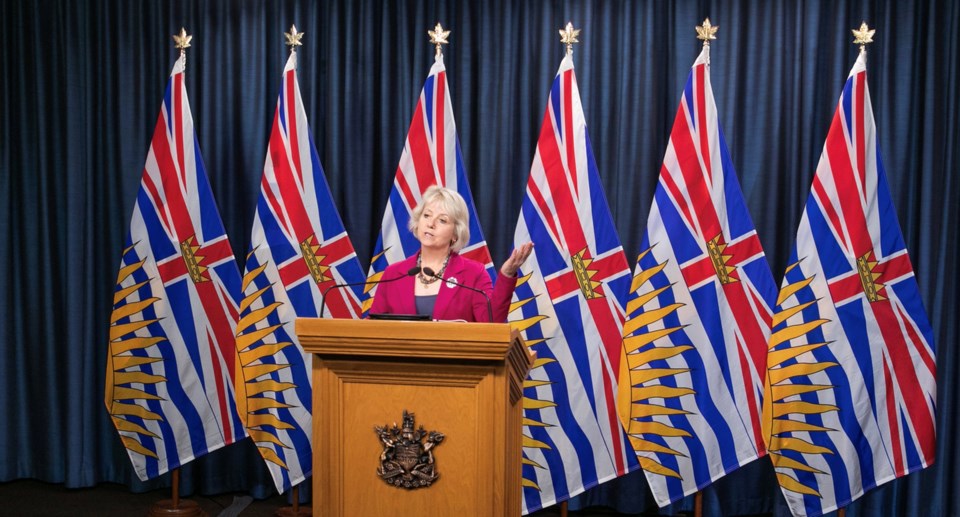The COVID-19 pandemic claimed the lives of 13 more British Columbians in the past day, in what is the highest number of deaths in a single day since February 3.
There were also . Higher numbers of deaths have been announced in government data updates since February 3, but those totals were always on Mondays, and included multiple days' death tolls.
The new deaths include:
• two in the Fraser Health region;
• three in the Vancouver Coastal Health region;
• three in the Interior Health region;
• three in the Northern Health region; and
• two in the Island Health region.
The fatalities underscore the dire outcome that can arise from catching COVID-19, although the vast majority of the 200,898 British Columbians infected with the disease – 193,325 people, or 96.2% – are deemed by the B.C. government to have recovered. Victoria's standard for determining a recovery is usually that the person has gone 10 days since symptoms first appeared.
There are 365 COVID-19 patients in B.C. hospitals with COVID-19, which is 12 fewer than yesterday. Of those, 142 are in intensive care units (ICUs), with that number being up six, compared with yesterday.
Health officials confirmed 649 new infections in the province in the past day, pushing the number of people known to be actively infected above the 5,000-person threshold for the first time since October 15. Most of the 5,106 people known to be actively battling COVID-19 infections have been told to self-isolate at home.
Northern Health is by far the hardest hit region in B.C., in part because the vaccination rate is lower in that area.
Glacier Media broke down the 649 new infections by health region, for each 10,000 residents (with total new cases in brackets).
• 1.6 in Fraser Health (281);
• 0.5 in Vancouver Coastal Health (61);
• 1.2 in Interior Health (88);
• 4.3 in Northern Health (130); and
• 1 in Island Health (89).
There were no new infections among people who normally do not reside in Canada.
The result by health region, for the 5,106 people fighting active infections, for each 10,000 residents (with total new cases in brackets) is:
• 11.4 in Fraser Health (2,051);
• 5.5 in Vancouver Coastal Health (693);
• 10.5 in Interior Health (778);
• 32.7 in Northern Health (980); and
• 6.4 in Island Health (545).
There are 59 active infections in the province in people who normally reside outside B.C.
Vaccinations in the general population have slowed as the vast majority of people are already vaccinated.
Health officials administered initial vaccine doses to 3,561 British Columbians in the past day, as well as second doses of vaccine to 7,473 people.
Across B.C., 89.4% of eligible people older than 12 have had at least one dose of vaccine, with 83.9% of eligible people having had two doses, according to the B.C. government.
Of the 4,145,426 B.C. residents who have received one dose of vaccine since mid-December, 2020, nearly 93.9%, or 3,891,058, are fully vaccinated, with two doses. Health Minister Adrian Dix said earlier this week that about 60,000 residents, who are either immunocompromised or who live in seniors' living facilities, have received three doses of vaccine.
"We do track vaccine effectiveness, [and] hospitalization, as a measure of severe illness by what combination of vaccines people received," Provincial health officer Bonnie Henry said earlier this week.
"What it does show us across the board, is that every combination is very effective at preventing severe illness. The AstraZeneca-AstraZeneca [combination] is slightly less than every other combination in terms of preventing infection, but if you go to AstraZeneca, and then in an mRNA vaccine, that protection goes back up again."
The B.C. government estimated in July that the , so Glacier Media's calculation is that more than 80.5% of B.C.'s total population has had at least one dose of vaccine, and nearly 75.6% of the province's total population has had two doses.
The small slice of the population that is not vaccinated is responsible for the lion's share of cases, hospitalizations and deaths.
Dix on October 22 tweeted out data otherwise unavailable that show 82.5% of the 143 individuals in B.C. ICUs are unvaccinated. Another 2.1% of people in those wards are partially vaccinated, and 15.4% of those people are fully vaccinated.
When adjusted for age, in the week up to October 20, there were 311.3 people newly infected for each 100,000 unvaccinated British Columbians. In that same time period, there were only 99.5 people newly infected for each 100,000 partially vaccinated British Columbians, and only 36.7 people newly infected for each 100,000 fully vaccinated British Columbians.
To do a similar accounting, but for hospitalizations, the value of vaccines is even more clear.
When adjusted for age, in the two weeks up to October 20, there were 55.7 people newly hospitalized for each 100,000 unvaccinated British Columbians. In that same time period, there were only 11.5 people newly hospitalized for each 100,000 partially vaccinated British Columbians, and only 2.3 people newly hospitalized for each 100,000 fully vaccinated British Columbians.
No health-care facilities have newly recorded active outbreaks, while Cooper's Place in Vancouver's Downtown Eastside has had its outbreak declared to be over. That leaves B.C. with 25 active outbreaks at health-care facilities. •




